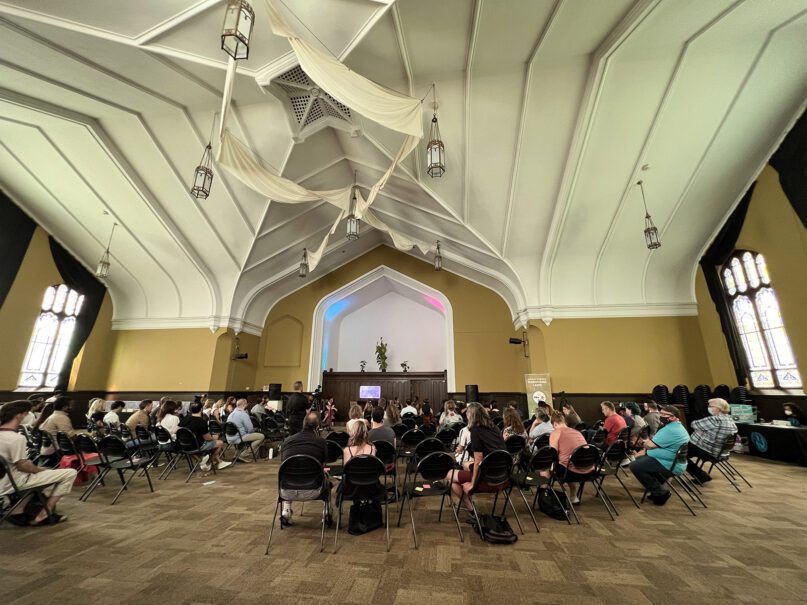PITTSBURGH (RNS) — Seated below the stained glass of a historic Gothic Revival church building with incense burning and lit by multicolored lamps, nearly 100 people were gathered on a recent summer day to hear speakers talk about how their lives had been transformed, not by faith but by psychedelic drugs.
The first EntheoCon, advertised as a “psychedelic salon,” held Aug. 20, was organized by a new network of advocates of plant medicine, who aim to create awareness about psychedelics’ healing properties. They had invited therapists, shamans, wellness gurus and community members to listen and perhaps reconsider the stigma attached to using psychedelic Schedule I substances.
A former church — built as a Presbyterian church in 1903 and now owned by an arts group called the Union Project — was a fitting place to open their minds, said Ross Sullivan, one of the organizers of EntheoCon (“entheo” is Greek for “God within”).
“There’s some sort of interesting juxtaposition, bringing this education and awareness around psychedelics into a space that used to be a church, where that connection to the mystical and to the divine was mediated.”
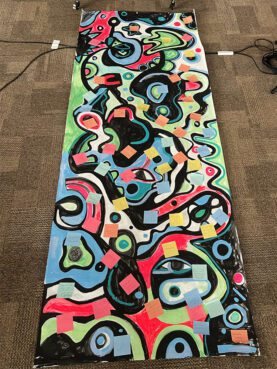
An immersive art piece at EntheoCon in Pittsburgh, Aug. 20, 2022. RNS photo by Kathryn Post
EntheoCon is part of a larger renaissance of sorts for LSD, psilocybin (“magic mushrooms”) and other psychedelics, which, after decades of association with the hippie era’s mind-bending moods and “acid rock” music, are being demystified in academic and medical fields. Low-dose treatments with psychedelics have been shown to help with depression and other mental illnesses.
The substances are also popping up lately as church sacraments and in chaplaincy settings.
“We’re seeing the emergence of a psychedelic religion or religious culture,” said Gary Laderman, a religion scholar at Emory University in Atlanta who teaches a popular course called “Sacred Drugs.”
Of course, it isn’t news that psychedelics can offer mystical experiences — Indigenous peoples have been using psychedelics in rituals for thousands of years. But those who presented at EntheoCon aim to educate those already open to exploring spiritual healing techniques about the benefits of psychedelics in treating mental health and expanding consciousness.
Sullivan, who lives in Harrisburg, Pennsylvania, was raised Jewish but stopped practicing after his bar mitzvah. “A lot of the values within Judaism are also values I can relate to having from having had psychedelic experiences,” he said. He credits psychedelics for eventually helping him reconnect to his Jewish values and ancestry.
Sullivan said psychedelics also equip him to better connect to himself, to nature and to the community, a goal that appeals to him as essentially spiritual, if not religious.
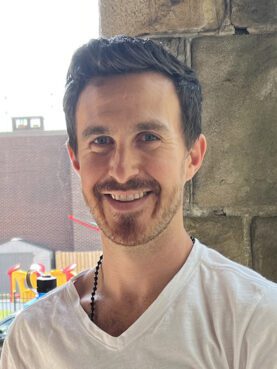
Ross Sullivan. RNS photo by Kathryn Post
In one memorable instance, Sullivan recalled seeing a geometric plane where everything was interconnected. “The felt sense that I had was this feeling of witnessing beauty and feeling love,” said Sullivan. “To me, it felt like direct contact with oneness.”
Six months ago, Sullivan founded the Center for Psychedelic Education, one of a number of grassroots, pro-psychedelic groups that have cropped up in recent years. In 2020, Sa’ed Al-Olimat started PsiloHealth, which was among the co-hosts of EntheoCon, to facilitate online integration workshops where attendees discuss their “dose day” experiences. PsiloHealth’s psilocybin peer supporter certification program educates lay people to use psilocybin safely. Al-Olimat, a pharmacist, told Religion News Service that PsiloHealth hopes to train clinicians as well as partners for psilocybin peer supporters.
“We believe in the value of healer inclusivity. Meaning that just because you’re a decorated clinician does not mean that you have exclusive right to only be the ones to offer dose day support. And I’m saying that as a clinician,” Al-Alimat said.
Elizabeth Sheldon, a longtime Washington, D.C., media executive and former publisher of The New Republic magazine, co-founded a plant medicine marketing group three years ago called the Plant Media Project, which also helped to organize EntheoCon. (The group also has an educational plant medicine podcast called “The Vine.”) Sheldon, who advocates for making psychedelics available to all who need them, believes they will need government and medical approval before they are accepted.
“I think the grassroots is beautiful and important, but in my opinion, it’s going to take the people that are at the top of the food chain, as always, to push this stuff through,” Sheldon said in a phone interview.
Laderman said psychedelics are in an “in-between space” — no longer underground but still legally restricted. “We’re not clear who should be authorized to prescribe or ceremonially offer psychedelics. How is that going to be monitored and controlled?”
Those questions, according to EntheoCon panelist Jonathan “Quest” Brown, have already shaped some marginalized communities’ relationship to psychedelics.
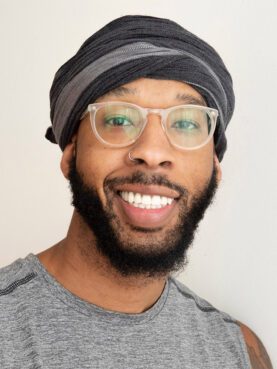
Jonathan Brown. Photo by George Lange
“My role, I feel, is to speak to Black and brown communities,” Brown, a yoga instructor and reiki master, told RNS. “It’s really important to me to use my voice to speak out to my community and let them know about these tools that can be used to address the trauma we’ve had for many years.”
Brown’s journey into the wellness space has been a long one. Growing up in Pittsburgh, he said, he saw his community disproportionately criminalized by the war on drugs. Some of his family and friends are still behind bars for selling marijuana even as, today, he noted, cannabis dispensaries appear on street corners.
“It’s scary to come out of the psychedelic closet as a Black man,” Brown said at the EntheoCon panel, pointing out that Black and brown people are more likely to be punished for involvement with drugs than white people. The stigma, Brown said, kept him from trying psychedelics until he was 32, and then only in another country.
What started out as recreational evolved, he said, and became part of his healing from grief after his mother’s death.
RELATED: Calling all mystics: Clergy psychedelic study aims to awaken spiritual experiences
Brown attended Catholic school but as an adult was baptized at a Presbyterian church. His journey with meditation, healing and psychedelics has expanded his spiritual framework, and while he still considers Christianity to be the foundation of his faith, he also calls himself an omniest — someone who finds truth in all religions.
Brittany Rogozinski, an intuitive body healer, told the audience at EntheoCon that plant medicine taught her how much she didn’t know about God. “That first experience, I felt like it did reconnect me to my true Spirit, the Great Spirit, or God, for the first time ever in my entire life,” she told RNS.
Rogozinski said she sees fungi as a natural source of ancient wisdom that connects the entire planet.
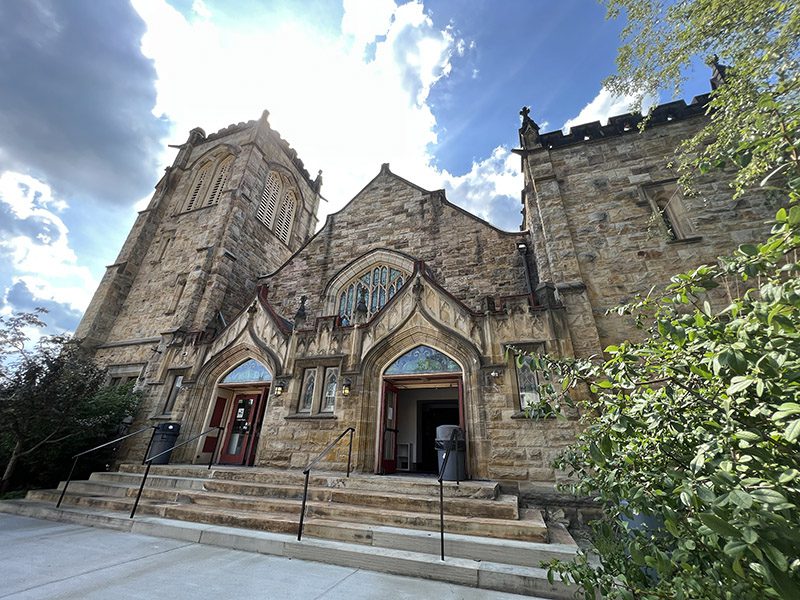
EntheoCon met at The Union Project, a former Gothic Revival church, in Pittsburgh. RNS photo by Kathryn Post
Laderman warned that those advocating for the benefits of psychedelics can, at times, be overzealous. “We are getting carried away by the testimonials and mythologies,” he said, pointing out that psychedelic experiences can be “dark, dramatic, painful and worse.” But he believes they will continue to shape the American religious landscape, in and outside of institutional contexts.
In the meantime, Laderman suggested, psychedelics will continue to be legitimized through research, and grassroots advocates like EntheoCon’s organizers will work to expand access while preserving psychedelics’ traditional sacred nature.
Rogozinski agreed. “I worry that we will lose the spirituality with it,” she said. “I really want people to realize that using these substances is such a brilliant gateway back to who they truly are, and our divinity.”
RELATED: ‘Changing Our Minds’ explores psychedelic drugs and spiritual healing
